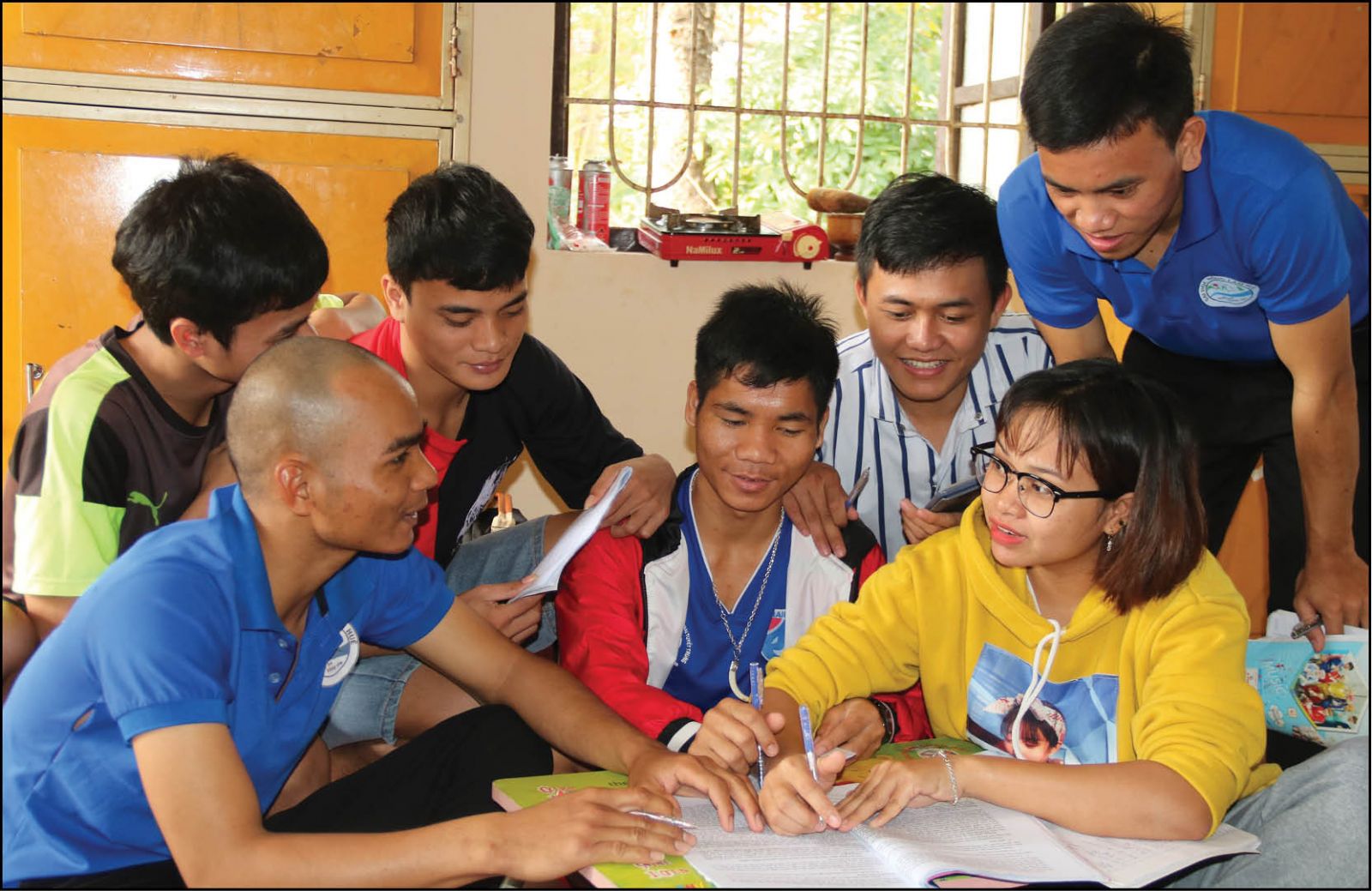
The members of the highland youth club guiding one another in learning
Practicing presentation in Vietnamese
At night, in the cold weather, the light of a room at the University of Agriculture and Forestry, Hue University was still shining. Dozens of people were watching a student introducing himself.
Occasionally, the introduction was interrupted. That student stood still, and the audience helped him. Ho Sang, the Ba Na student standing beside me, explained: "He is practicing communication skills and presentation in Vietnamese”.
Practicing communication skills and presentation in Vietnamese are unfamiliar to me, but to Ho Sang, it is a familiar activity that she used to experience in the past. Ho Sang said: “In the past, whenever I had presentation in Vietnamese, I could speak only my name, my hometown and my family members. I had just entered the university, so I was timid. Because of the lack of Vietnamese vocabulary, it was difficult for me to communicate; therefore, I was afraid to contact everyone, even with my classmates.”
Considering that it is the typical weakness, after the establishment of the Highland Youth Club (September 2016), every meeting, apart from cultural and academic exchanges, the members spent time practicing the skills, especially those of communication and presentation. Nearly 100 people from 15 ethnic groups of Vietnam and Laotian students attended speaking practice.
Head of the club, Ho Van Tran, explained: “For us, Vietnamese is like a second language, despite having studied it for 12 years at high school. Being bad at communication is difficult to integrate into the community and find jobs; therefore, such training sessions sometimes last for an hour or two but everyone gives tries.
|
Highland Youth Club belongs to University of Agriculture and Forestry, Hue University. Club members include ethnic groups such as Pa Ko, Ta Oi, Co Tu, Van Kieu, Cham, Thai, Nung, Gie Trieng, JaRai, E De, Ba Na, Co, Ca Dong, Hre, Kinh and Laotian students.
|
The club members are mostly from similar backgrounds, so no one feels shy or frustrated. Each time they meet, students help each other with their Vietnamese communication and presentation skills.
In addition to ethnic minority students, some Kinh people also join in to support other practice the presentation skills. The theme of each activity can be changed, from stories that introduce themselves to how to promote the cultural beauty, customs and traditions of their own people.
Ho Van Tran also said: “When I first came to Hue City to do enrollment procedures, I was afraid of communicating and being ripped-off, hence, I had to come back to A Luoi. But now, thanks to proficient communication skills and a wide range of vocabulary, the old anxiety has faded away. Now, I feel brave and confident to communicate in Vietnamese.
Eliminating the thought of dropping out of school
In addition to helping each other to study, members of the Highland Youth Club have another rather important task which is to push back the thought of dropping out of school. Ho Van Tran said: “Most upland students are disadvantaged, so it is easy to develop the idea of being bored and dropping out of school. There are no complete statistics, but according to the estimates of club members, every year there are about 10-20% of ethnic minority students who want to leave school.
A typical case is that of KSor Nham (a Jarai student). He wanted to drop out of school in his 3rd years at university. KSor Nham said that his father had worked hard to support the family. When his father passed away, Nham felt that everything fell down; and, he had the intention of dropping out of school to earn money to support his mother.
In the first semester of the third year, Nham studied for only one day and then took a month off, then made his farewell to everyone to go to Hanoi to work. But only 3 days later, Nham returned to Hue. “I miss the school, the advice of teachers, friends, and members in the club. So, I decided to return,” said KSor Nham.
According to Ho Sang, the stories like that of KSor Nham are quite popular, but they always have a happy ending when everyone stays with school. The secret to encouraging people not to drop out is not only from the club's managing board but almost from everyone: that is to share difficulties with each other.
Many ethnic minority students are very poor, sometimes their parents still have not yet sent money to them for 2 to 3 months; so, whenever we know that they "got stuck", we lend them money, rice, even fish sauce, salt, gas, and so on with the motto: "Whoever has rice, give rice, whoever has fish sauce, give fish sauce".
Since the club came into being, 223 members have been admitted. The thought of leaving school also becomes less. The senior students help the junior ones to graduate through the encouragement. Those who have graduated and get jobs also help the ones still learning overcome their difficulties.
Typically, former student Poloong Thi Mai Hue sometimes supports the club fund to partly support the fee for the students. Speaking of this, some students or alumni say they are fulfilling a dream together.
On every club meeting, that dream is evoked not by words but by the effort of practicing Vietnamese presentations and by the encouragement of students from 16 ethnic groups (including Lao students). They all write a beautiful story: in the heart of the ancient Imperial Capital, there is a dream of highland students - the dream of overcoming difficulties in studying to escape poverty.
Story and photo: Huu Phuc